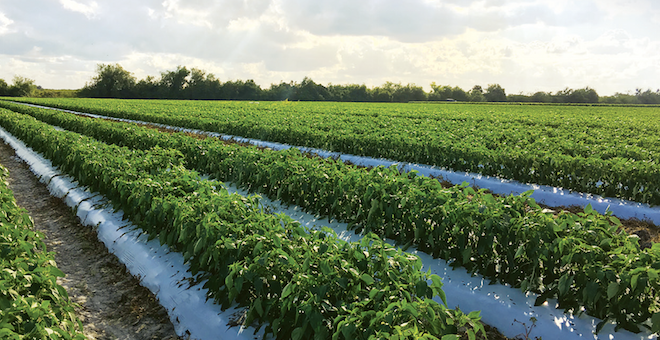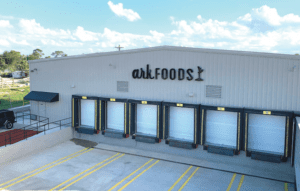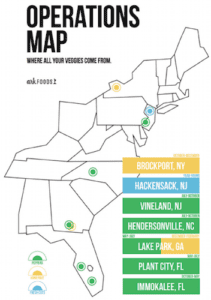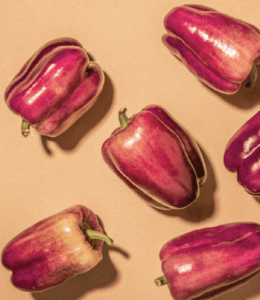

Feb 17, 2021Niche peppers, packinghouse boost Ark Foods’ ascent
A packinghouse of one’s own is a milestone for a young produce company.
So, when in 2020, a vegetable operation based in Brooklyn, New York, bought a 12,000-square-foot facility near the agricultural town of Immokalee, Florida, it was a moment worth celebrating.
Ark Foods – a startup produce company finding new niches in vegetables, especially the pepper category – was founded by Noah Robbins in 2013, and began farming in Immokalee the following year. The area feels like home for the young company – a good place for its first owned facility.
After additions and improvements, the packhouse was ready for work by late fall 2020. The packinghouse is processing specialty peppers, heirloom cherry tomatoes, honeynut squash, and other specialty vegetables. It also will serve as a distribution hub.


“It was a significant investment for us, but made sense because we believe in the community and the future growth of the company,” Robbins said. “Our team worked diligently throughout the summer and early fall on structural repairs, state-of-the-art upgrades and equipment installations to open a facility we’re truly proud of, and one that will carry us into the next chapter of Ark Foods. To have a growing operation in Florida means more than it ever did.
“It means we’re able to make more of an impact on a community we’ve been part of since our early days,” Robbins continued. “Eventually, we’d love to have staff working there year-round. Logistically, we’re able to load more trucks more efficiently, and position ourselves for strong, competitive output.”


An agricultural heritage
The son of citrus farmers, Robbins grew up in Connecticut but would visit the farm operations a couple of times per year.
“I learned a lot about the operational side of farming at a very young age: locking in contracts, sales, mitigating the risk of your output, how to increase the sugar content of citrus,” he said.
“I also learned a lot about costs, crew management for acreage, how to manage the weather. These things have been drilled into me since childhood, and really translate into how Ark Foods operates, specifically with diversifying our farming locations, our crops, and our growing techniques.”
At Cornell University, he studied art rather than agriculture, but “it was important to continue the generational line of farming in the family,” and Robbins knew he wanted to go back to agriculture. His company’s launch in 2013 was centered on shishito peppers that, he had discovered, were being flown in from Japan to supply restaurants.
“Chefs want what they want when they want it,” he said. “Ark Foods has worked since our founding to develop a program that meets the demand across the country. We use the same seeds as you would find in Japan. The only reason why shishitos were being flown in from Japan in such high numbers is because they simply weren’t accessible here in the U.S.”


Finding niches
That logical method of finding niches in the vegetable market has allowed the company to grow into other crops, doubling its acreage each year from 2016-2019. Red Fresno Chili peppers have become another signature vegetable alongside the shishitos. Ark Foods launched a veggie bowl product in 2018 with vegetable stand-ins for noodles and expanded the veggie bowl line in early 2020 with more flavors. Robbins declined to give specific acreage counts, but said it has growing operations in New York, New Jersey, North Carolina and Georgia in addition to Florida.


In late 2020, the company introduced a glossy purple bell pepper marketed to be the first of its type grown “at scale,” as opposed to small farm markets.
Lou Terrulli, director of farm development for Ark Foods, said in a news release that the variety breaks new ground in the pepper category.
“The Purple Bell is a great entry point for people who know and love the taste of bell peppers, but are looking for more diversity and excitement on their plate,” he said.
Ark Foods items are carried nationwide at Whole Foods Market, Costco and Walmart. The company operates without middlemen, and has its own freight line.
“Growing and marketing unique vegetables is a very difficult thing to do, and we decided early on that if we’re going to do anything, we’ll do it ourselves,” Robbins said. “It was critical from day one that we are deeply involved in the entire process, from seed selection to distribution. We’ve been fortunate to create a successful program around that structure. While brokers certainly have their value, we’re proud to be hands-on.”
— Stephen Kloosterman, associate editor














